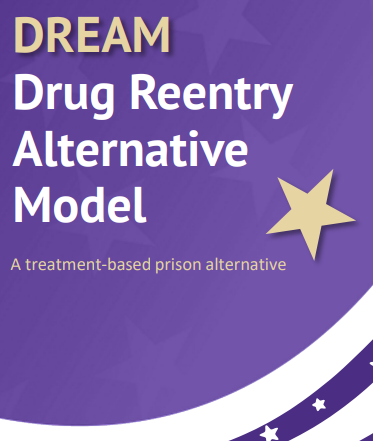 DREAM is a post-plea/pre-adjudication program in which the participant enters a guilty plea and his/her sentencing is held in abeyance while the participant completes the program. Participants will also execute a DREAM contract in which they agree to participate in the program and abide by the governing terms of the program. Participants will be involved in DREAM for at least 12 months, though the term of involvement may be extended as necessary to a maximum of no more than 24 months. The program is intended to be flexible, working at each individual’s pace with an understanding that the process is a slow track to recovery.
DREAM is a post-plea/pre-adjudication program in which the participant enters a guilty plea and his/her sentencing is held in abeyance while the participant completes the program. Participants will also execute a DREAM contract in which they agree to participate in the program and abide by the governing terms of the program. Participants will be involved in DREAM for at least 12 months, though the term of involvement may be extended as necessary to a maximum of no more than 24 months. The program is intended to be flexible, working at each individual’s pace with an understanding that the process is a slow track to recovery.
Successful completion of the DREAM program leads to dismissal of the charge(s). If a participant is terminated from the program, the sentence is imposed by the district court judge overseeing the DREAM program, pursuant to the previously entered plea.
Referral Process
Please download and complete the DREAM Referral Form in order to be considered for participation within the program. Submit the completed form and any pertinent supplemental materials to dreamteam@wawd.uscourts.gov. Use this Redacted Example Referral as a reference when completing your referral form. To ensure delivery, attachments must be under 10 MB, per email submission.
Please visit the District Court's page for additional information regarding form submission deadlines as well as upcoming DREAM Calendar dates. The program brochure also contains useful information.
If you are accepted into the DREAM Program, you should review the DREAM Contract and Release of Information in advance of court.
Eligibility Criteria
- The person is charged with a felony in the Western District of Washington for any offense except possession of a firearm during the commission of the alleged offense; unlawful possession of a firearm; an offense involving brandishing or use of a firearm or other deadly weapon; a sexual offense, including an offense related to child exploitation or child pornography, or an offense involving sexual abuse or sexual assault; a serious violent offense, an offense resulting in serious bodily injury or death; a public official or former public official accused of an offense arising out of an alleged violation of public trust; an offense related to national security, including a terrorism offense, or foreign affairs; or an offense in connection with which the individual held a significant managerial role in a large-scale criminal organization or in a violent gang.
- The charged criminal conduct appears motivated by a substance use disorder.
- The person is a lawful resident or citizen of the United States and resides within the Western District of Washington.
- The person has no more than 3 criminal history points under the U.S. Sentencing Guidelines, Chapter 4, excluding criminal history points for misdemeanors or gross misdemeanors.
- The person has or is willing to enter a guilty plea prior to admission into the program.
- The application includes a recent Substance Use Disorder Assessment.
- The person is willing to participate in mental health and substance use disorder treatment, as required by the Executive Review Team.
- The person may not work as an informant for the government during their participation in DREAM.
Underlying Principles
- Integration of substance abuse treatment with justice system case processing, i.e., incorporate social services and treatment programs under the traditional guise of the court system.
- Use of a non-adversarial approach, in which the prosecution and defense counsel promote public safety while protecting the right of the participant to due process.
- Early identification and prompt placement of eligible participants.
- Access to a continuum of treatment, rehabilitation.
- Frequent testing for alcohol and illicit drugs.
- A coordinated strategy among the judge, prosecution, defense and treatment providers to govern offender compliance.
- Ongoing judicial interaction with each participant.
- Monitoring and evaluation to measure achievement of program goals and gauge effectiveness.
- Continuing interdisciplinary education to promote effective planning, implementation, and operation.
- Partnerships with public agencies and community-based organizations to generate local support and enhance drug court effectiveness.
